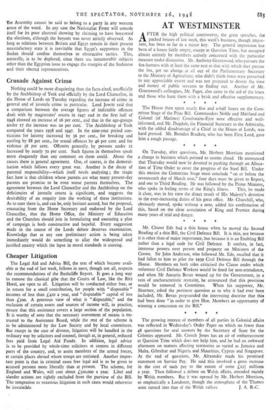ATWESTMINSTER
AFTER the high political controversy, the great speeches, the packed houses of last week, this week's business, though impor- tant, has been so far in a minor key. The general impression has been of a house fairly empty, except at Question Time, but occupied almost entirely by members actively concerned with the particular measure under discussion, Mr. Anthony Greenwood, who pursues the fox-hunters with at least the same zest as that with which they pursue the fox, got no change at all out of the Parliamentary Secretary to the Ministry of Agriculture, who didn't think foxes were preserved to any appreciable extent and was not prepared to devote the time and money of public servants to finding out. Another of Mr. Greenwood's colleagues, Mr. Paget, also came to the aid of the foxes and those who hunt them with a brisk .and effective supplementary.
The House then spent nearly five and a-half hours on the Com- mittee Stage of the Prize Bill. Commanders Noble and Maitland and Colonel (of Marines) Crosthwaite-Eyre were effective and well- informed, and Mr. Dugdale, the Financial Secretary to the Admiralty, with the added disadvantage of a Chief in the House of Lords, was hard pressed. Mr. Brendan Bracken, who has been First Lord, gave him a rough passage.
* * * * On Tuesday, after questions, Mr. Herbert Morrison mentioned a change in business which pointed to storms ahead. He announced that Thursday would now be devoted to pushing through an Alloca- tion of Time Order to cover the progress of the Steel Bill. Under this motion the Committee Stage must conclude "on or before the seventeenth day of March next," four days must be given to Report, and one to Third Reading. He was followed by the Prime Minister, who spoke in feeling terms of the King's illness. This, he made it clear, was in his view the direct result of His Majesty's devotion to the ever-increasing duties of his great office. Mr. Churchill, who, obviously moved, spoke without a note, added his confirmation of this, based on the close association of King and Premier during many years of trial and danger.
* * Mr. Chuter Ede had a thin house when he moved the Second Reading of a thin Bill, the Civil Defence Bill. It is thin, not because it is other than of major importance, but because it is an Enabling Bill rather than a legal code for Civil Defence. It confers, in fact, immense powers over person and property on Ministers of the Crown. Sir John Anderson, who followed Mr. Ede, recalled that it had fallen to him to pilot the 1939 Civil Defence Bill through the House. Members on both sides criticised the Clause under which volunteer Civil Defence Workers would be fined for non-attendance, and when Mr Aneurin Bevan wound up for the Government, in a vein of uncharacteristic restraint, he announced that this provision would be removed in Committee. When his supporter, Mr. Shurmer, asked the pertinent question as to why it had ever been included, Mr. Bevan propounded the interesting doctrine that this had been done "in order to give Hon. Members an opportunity of winning a concession on the Bill."
The growing interest of members of all parties in Colonial affairs was reflected in Wednesday's Order Paper on which no fewer than 48 questions for oral answers by the Secretary of State for the Colonies appeared. Mr. Creech Jones has an air of embarrassment at Question Time which does not help him, and he had an awkward afternoon on matters affecting territories so varied as Jamaica and Malta, Gibraltar and Nigeria and Mauritius, Cyprus and Singapore. At the end of questions, Mr. Alexander made his promised statement on Service Pay. He said this involved a gross increase in the cost of such pay to the extent of some £12+ millions a year. Then followed a debate on Welsh affairs, attended mainly by Welsh members. But it was opened by Mr. Herbert Morrison, so emphatically a Londoner, though the atmosphere of the Thames soon turned into that of the Welsh valleys J. A. B.-C.




































 Previous page
Previous page